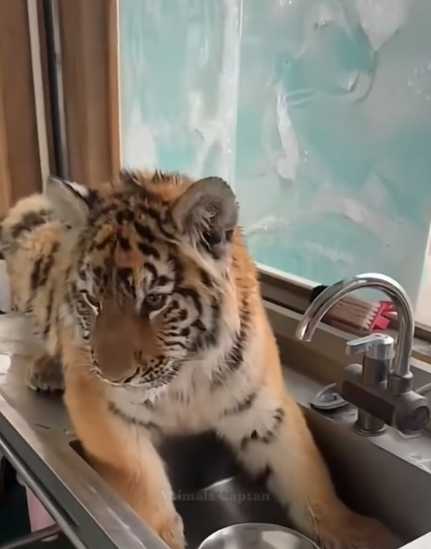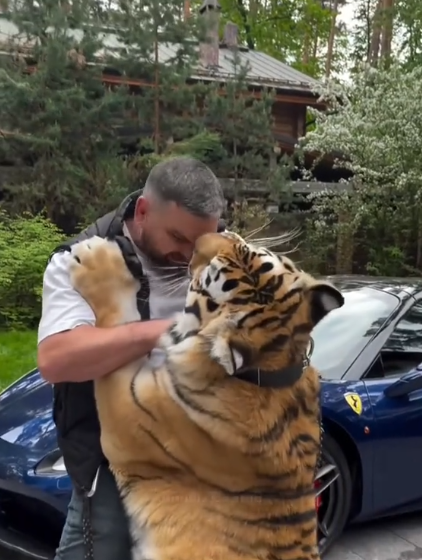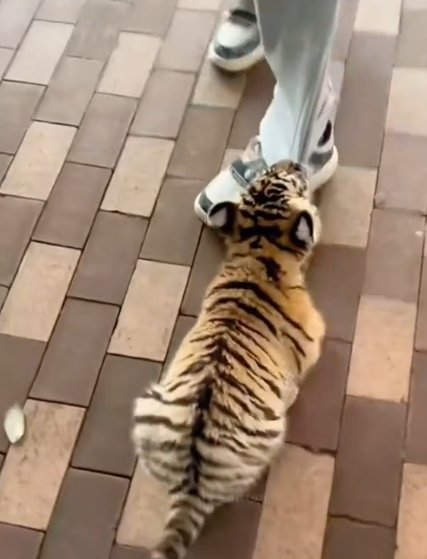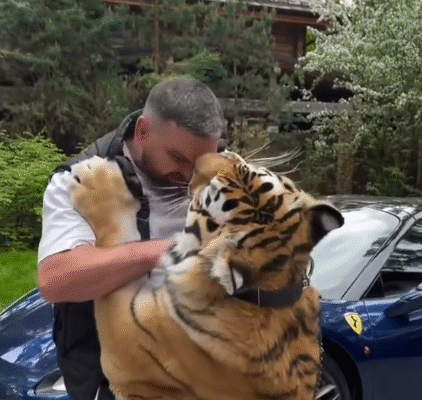
The snowstorm had raged through the night, blanketing the forest in a thick, unbroken layer of white. Trees stood like silent sentinels, their branches heavy with frost, and the air was still, muffled by the icy cover. It was the kind of cold that bit through layers of clothing and stung the lungs with every breath.
Ravi, a young forest ranger stationed at the edge of the Taiga Reserve, had been awake since dawn. His radio had crackled with static before a faint, urgent voice broke through — a local villager had spotted a small tiger cub alone near the riverbank, shivering and crying in the cold. The storm had separated it from its mother.
Ravi grabbed his thick coat, gloves, and a woolen hat before checking his rescue kit — thermal blanket, first-aid supplies, food rations, and a tranquilizer in case the mother tiger returned unexpectedly. He slung his camera over his shoulder too. Not for glory, but for documenting the rescue for the wildlife authorities.
The trail to the riverbank was nearly invisible under the snow. Ravi trudged forward, his boots sinking deep with every step. He followed faint paw prints — tiny for a tiger, with edges softened by drifting snow. The prints zigzagged, as if the cub had been wandering in confusion.
After an hour, he spotted movement through the trees. A small, striped bundle lay curled near a fallen log, barely visible against the snow. The cub was trembling, its breath coming in faint white puffs. Its fur was matted with frost, and its eyes, usually bright and curious in young tigers, were half-lidded with exhaustion.
Ravi crouched low, speaking softly so as not to startle it. “Hey there, little one… you’re safe now.” His voice was calm, though his heart pounded. Wild tiger cubs were rarely alone for long — the mother could be close by, watching from the shadows. He scanned the tree line, every crunch of snow under his boots sounding louder than it should.
The cub gave a weak cry, the sound barely audible. Ravi could see its tiny paws were raw from walking in the ice. Kneeling beside it, he opened his thermal blanket and gently wrapped the cub, careful not to cover its nose and mouth. The cub didn’t resist — a worrying sign of just how weak it had become.

On the way back, the snow began falling again, the wind whipping it into his face. Ravi tightened his hold on the cub, feeling its small body press against his chest for warmth. The journey to the ranger station seemed twice as long, but he pushed forward, thinking only of getting the animal safe.
When he reached the station, Ravi quickly lit the small wood-burning stove. He placed the cub on a padded mat near the warmth, rubbing its fur gently to encourage circulation. He offered a small bottle of warm goat’s milk, knowing it would be easier for the cub to digest than water. At first, it didn’t respond, but after a few moments, it began to lap weakly. Relief flooded through Ravi.
By afternoon, the snowstorm had subsided, leaving the world outside glittering under the winter sun. The cub’s breathing had steadied, and it was sleeping soundly, curled into a small ball. Ravi took the opportunity to call the wildlife rescue center, explaining the situation. They promised to send a team in the morning — the roads were still blocked by snow.
That night, Ravi stayed awake, checking on the cub every hour. Sometimes it whimpered in its sleep, perhaps dreaming of its mother. Ravi wondered if the mother was still alive, or if the storm had claimed her. The thought weighed heavily on him.
Morning brought the distant rumble of an engine — the rescue team had arrived in a snow-adapted jeep. Two wildlife veterinarians stepped out, their breath clouding the cold air. After examining the cub, they confirmed it was around three months old, slightly underweight but otherwise free of major injuries.
They loaded the cub into a secure, padded carrier. “We’ll take it to the rehabilitation center,” one of the vets explained. “If we can’t locate the mother in the next few days, we’ll raise it until it’s old enough to be released.”
Ravi watched as the jeep disappeared down the snowy road. A part of him felt an ache — in just a day, he had grown attached to the little creature. But he knew it was going somewhere safe, somewhere it would get the care it needed.

Weeks later, Ravi received an email from the center. Attached was a photo of the cub, now lively and alert, playing in a large enclosure with another rescued tiger. They had named him Shiro, meaning “white” — not for his color, but for the snowstorm from which he had been saved.
The message also brought unexpected good news: trackers had found Shiro’s mother alive in the forest. Once the cub regained his strength, they planned to reintroduce him to her. It would be a careful process, but if successful, Shiro would grow up wild and free, as he was meant to.
The day Shiro returned to the wild, Ravi stood quietly among the rescue team, bundled in his coat against the still-chilly air. The cub — no longer frail — bounded out of his carrier, his striped coat gleaming in the winter sunlight. He stopped once, glancing back toward Ravi as if in recognition, before disappearing into the forest where his mother waited.
Ravi smiled, feeling a deep sense of peace. The storm had been merciless, but out of its cold fury had come a small, bright victory — the rescue of a life that might have been lost.
And so, the forest returned to its natural rhythm. The snow would come and go, storms would rage and pass, but somewhere among the trees, a young tiger named Shiro roamed with his mother, his paws leaving fresh prints in the snow — prints that might one day be followed by another ranger, on another rescue mission, in the never-ending story of the wild.



